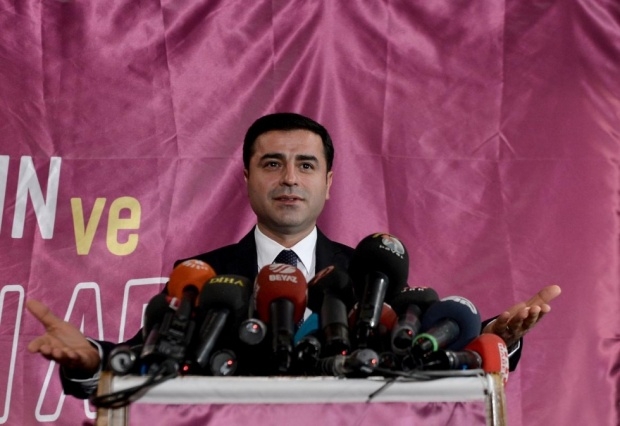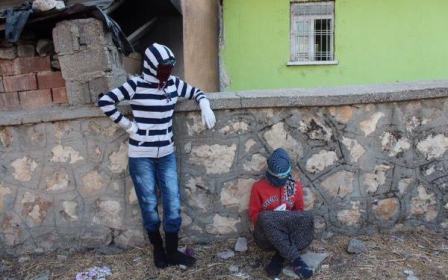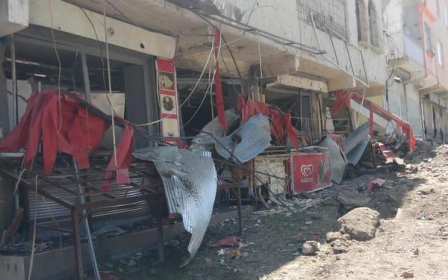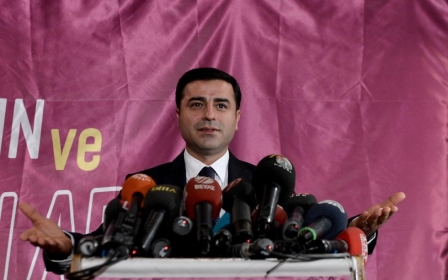Pro-Kurdish leader calls on PKK to halt violence

The leader of Turkey's main pro-Kurdish political party on Saturday called on Kurdish militants to halt a month of violence against the security forces "without ifs or buts".
The comments were the clearest call yet from Selahattin Demirtas - the charismatic young leader of the pro-Kurdish, left-leaning Peoples' Democratic Party (HDP) - for the Kurdistan Workers' Party (PKK) to agree to an unconditional ceasefire.
"The PKK has to stop its armed attacks and bombings in the towns and the mountains without ifs or buts," the Dogan news agency quoted Demirtas as saying in a speech in the western city of Izmir.
"There is no alternative for us," said Demirtas. "More deaths of Kurds, Turks, soldiers, guerillas and police must be stopped."
Earlier this month, Demirtas had equally called on both the Turkish government and the PKK to return to peace talks after having initially said that the HDP had no control over the actions of the PKK.
It is unclear if Demirtas's call for an end to violence will have any impact on the PKK, whose leader, Abdullah Ocalan, is serving a life sentence on a Turkish prison island. The PKK previously stated that the decision to lay down arms cannot be made by the HDP or Ocalan himself.
At the same time, the government accuses the HDP of being the PKK's political wing, but Demirtas has repeatedly insisted that there is distance between the two organisations.
"It is clear that statements that imply a divergence between the HDP and PKK would help the HDP reach to the wider public, particularly in western Turkey in the next election. We can expect to hear similar statements just before a snap election that will take place in November," Demir told MEE.
HDP municipalities have been accused of providing material assistance to PKK militants, while in July Turkey’s highest courts launched a criminal investigation against HDP deputies for allegedly having links with the outlawed group.
Several HDP deputies have been accused by the government for openly supporting the group, including the party’s co-chair Figen Yuksekdag, who called the PKK "a national liberation movement [and] an organization that stands for democracy and equality,” Daily Sabah reported.
The PKK has been staging daily attacks against the Turkish armed forces as the military keeps up air raids and operations against the group's strongholds in southeast Turkey as well as northern Iraq.
Over 50 members of the Turkish security forces have now recently been killed in attacks blamed on the PKK, leaving a 2013 ceasefire in tatters.
Demirtas accused Erdogan's ruling Justice and Development Party (AKP) of "wanting" a civil war in Turkey to boost his own power.
"No one had anything to win from a civil war in Turkey. Just look at Syria and Iraq."
But Demirtas said killing soldiers and police was not the way to bring the AKP to account. "They are also the children of this country, our children," he said.
Erdogan is hoping that that AKP will regain its overall majority in the 1 November polls that it lost on 7 June.
Analysts say Erdogan may be sniffing a chance to squeeze the pro-Kurdish HDP in a re-run of the polls by whipping up concerns over its links to the PKK and hoping electors instead opt for the AKP.
For Erdogan "this is a chance to reshape the composition of the current parliament as Turkey heads into early elections," Soner Cagaptay, director of the Turkish Research Program at the Washington Institute, told AFP.
But Demirtas said such ambitions would not be realised, forecasting that the AKP would not even record the almost 41 percent it saw at the last polls.
Turkey – PKK relations further complicated
Turkey has been pursing an almost month-long campaign of air attacks against the PKK in the Turkish southeast and northern Iraq, launched after Turkey was hit by one of its deadliest attacks in recent years when 33 pro-Kurdish activists were killed in a suicide bombing on the Syrian border. The 20 July attack was blamed on Islamic State (IS).
The attack prompted a furious reaction from Kurdish militants, who shot dead two police in their sleep.
Ankara on 24 July launched its first air strikes against IS in Syria, then also began attacking targets of the PKK in northern Iraq, in a dual "war on terror".
It has since arrested around 1,600 people in a wave of counter-terrorism raids amid the spike in attacks targeting security officers. Police have been carrying out the nationwide operations to apprehend suspected militants of PKK, IS, and the far-left Revolutionary People's Liberation Party-Front (DHKP-C) - all three groups are designated as terrorist groups in Turkey.
Analysts say however that Turkey’s campaign against the PKK will only weaken but cannot destroy the Kurdish militant group.
The aim is "not to kill the PKK, not to decapitate it, not to provoke it into a full-scale war but to weaken it so it comes back to the negotiation table from a position of weakness," Cagaptay told AFP.
"But this is not a lab environment. There are various dynamics that could get out of control," he added.
According to the state-run Anatolia news agency, 771 PKK militants have been killed in the campaign, including 430 in the air strikes on their camps in northern Iraq.
Analysts cast doubt on the figures, and say dealing a fatal blow to the PKK would be impossible without a full-scale ground campaign.
"The PKK probably lost a few dozen people early on as they were not expecting such a sudden or ferocious series of air strikes," said David Romano, Professor of Middle East Politics at Missouri State University and author of "The Kurdish Nationalist Movement".
Cagaptay agrees: "In the absence of a parallel cross border operation that would involve ground troops, air strikes are effective only to an extent. They are more symbolic than crippling," he told AFP.
But Turkey is unwilling to end its operations against the PKK unless the group puts down its arms.
"The peace process is in great difficulty," said a Turkish government official told AFP last week. "As long as the PKK refrains from giving a concrete timetable for disarmament, the operations will continue," the official added.
Experts say that urgent reforms must be envisioned to end the escalation of violence.
Pinar Elman, Turkey analyst at the Polish Institute of International Affairs, said the past had shown that military means are not enough to defeat the PKK and reforms are needed.
"The PKK benefits from the Kurdish problem in Turkey and of the sociological base created by this problem," she said. "Turkey should question how the PKK has been able to recruit among young people despite the peace process."
Demir agrees: "The underlying premise behind the whole discourse of ‘Turkeyfication’ has been the idea that the correct platform for a solution to Turkey’s long-standing issues in general and the Kurdish question in particular is not an armed struggle but politics and greater democratisation," he told MEE.
Middle East Eye propose une couverture et une analyse indépendantes et incomparables du Moyen-Orient, de l’Afrique du Nord et d’autres régions du monde. Pour en savoir plus sur la reprise de ce contenu et les frais qui s’appliquent, veuillez remplir ce formulaire [en anglais]. Pour en savoir plus sur MEE, cliquez ici [en anglais].




